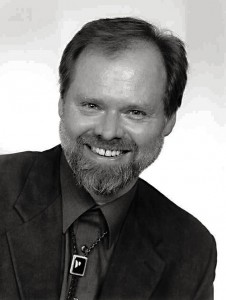
I met Pavel Dobrusky in the 1980s shortly after he defected from Czechoslovakia. He came to Perseverance Theatre in Alaska, where I was the producing director and a playwright and actor in the company. Pavel turned Perseverance upside down with his unconventional approach to theatre. His theatrical designs quickly became one of our company’s signatures.
Pavel was a hugely complicated person. He was at once funny, brooding, cynical, goofy, tormented and wildly creative. He was a brilliant designer (although he would scold me if I said that in his presence—he insisted on being called a scenographer, the word used in his beloved Prague). He was a provocative director, a sharp-eyed dramaturg and the life of every party. He had a big, booming laugh. He drank beer for breakfast. And he was a good friend. On one of my milestone birthdays he telephoned me from Norway (in the days when phone calls from Norway cost a fortune) to wish me a happy birthday.
Pavel had a profound effect on me as a young playwright. He introduced me to the importance of theatrical metaphor. He taught me the art of the stage, where “a leaf is never a leaf!” but always something more. Pavel often railed against the literalism of the American theatre and our fondness for realistic sets filled with couches and kitchen tables. He also railed against democracy. He insisted—boisterously—that it made for lousy theatre.
I never fully understood what he meant until I joined him in Prague several years ago when we were working on my new play The Velvet Weapon, a backstage farce about democracy inspired by the Velvet Revolution. Pavel and I spent a month interviewing the theatre artists who staged the revolution with Václav Havel by using their theatre skills to overthrow the Soviet-backed regime.
Pavel’s insistence on the use of metaphor stemmed from his years working as an artist behind the Iron Curtain, where playwrights couldn’t put their ideas into words without fear of reprisal. The job fell to the scenographers to create a visual language based in metaphor, so that the Czech nation could express forbidden ideas under the watchful eyes of their invaders. I suddenly understood Pavel’s insistence on being called a scenographer instead of a designer—the word “designer” just didn’t capture what he did, which was visual playwriting. And I understood why he thought democracy was bad for theatre. In a democracy we can say anything. We don’t need metaphor, and so we tend toward an expression that is literal.
It’s an uncomfortable thought with uncomfortable implications. But that was Pavel. He was a provocateur. He was full of contradictions: the man who fled Communism to live in a democracy, and then railed against it. The artist who was opposed to literalism and insisted upon metaphor, only to find in The Velvet Weapon, one of his last projects, that the best way to capture the backstage antics of the Velvet Revolution was to stage it as a backstage farce, which—alas—it literally was.
Pavel died too young. During his short time with us, he worked as a scenographer at theatres including Arena Stage in Washington, D.C., Virginia Stage, Cleveland Play House and Children’s Theatre Company in Minneapolis. One of his first jobs in the U.S. was to design Darrah Cloud’s Stick Wife, directed by Roberta Levitow at the Los Angeles Theatre Center. He worked with directors Molly Smith, Peter Hackett and Charles Towers on numerous projects. He was a regular at Perseverance Theatre and Denver Center Theatre CompanyDeb. He was a longtime collaborator with Per-Olav Sørensen of Norway.
Pavel’s theatrical vision ultimately proved too risky and too difficult for the American theatre. It’s been many years since he worked on our stages. We are the poorer for it. Pavel ended up leaving this country and returning to Prague, where he spent his final days. He died in April while working to create a theatre-training program for young artists. He will be sorely missed.
Deborah Brevoort is a playwright, the former producing director of Alaska’s Perseverance Theatre and an alumnus of New Dramatists.

